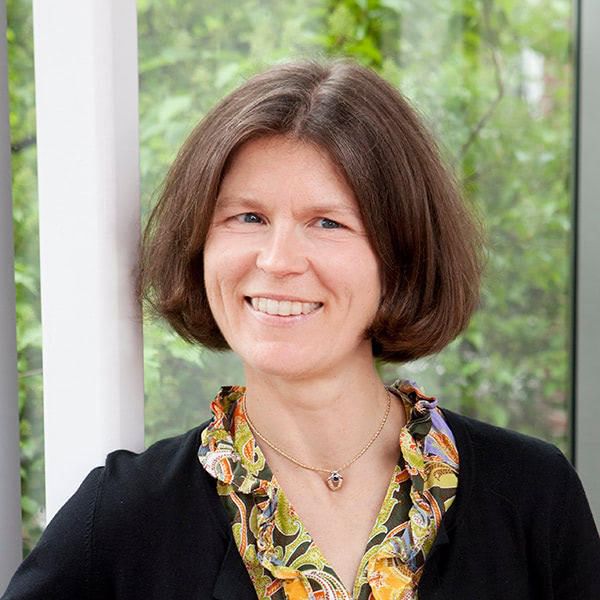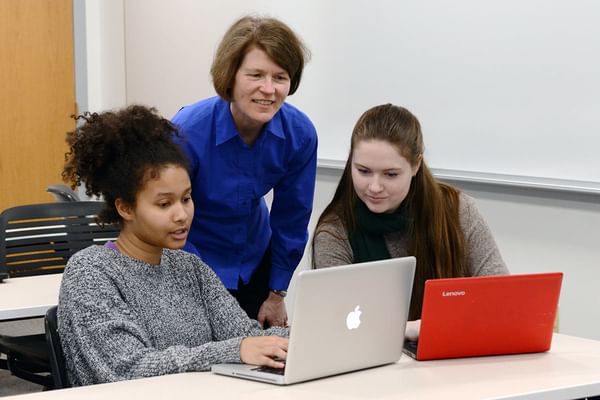- Undergraduate
Bachelor's Degrees
Bachelor of ArtsBachelor of EngineeringPartner School Dual-DegreeUndergraduate AdmissionsUndergraduate Experience
- Graduate
Doctoral Degrees
Doctor of PhilosophyPhD Innovation ProgramDoctor of Medicine-PhDGraduate AdmissionsGraduate Experience
- Research
- Entrepreneurship
- Community
- About
-

Petra Bonfert-Taylor
Professor of Engineering
Associate Dean for Diversity and Inclusion

Professor Bonfert-Taylor's research interests include engineering education, student-centered learning, and broadening participation.
Research Interests
Complex analysis; geometric function theory; discrete groups; complex dynamics; engineering education; student-centered learning; broadening participation
Education
- Vordiplom (BA equivalent), Technical University of Berlin 1990
- Diplom (MA equivalent), Technical University of Berlin 1994
- PhD, Technical University of Berlin 1996
Awards
- Fellow, Ivy+ Faculty Advancement Network Leadership, Dartmouth, 2022
- Fellow, Class of the Association for Women in Mathematics (AWM), 2020
- edX Prize for Exceptional Contributions in Online Teaching and Learning, 2019
- NH High Tech Council TechTeacher of the Year, 2018
- Excellence in Teaching Award, Dartmouth Engineering, 2016
Professional Activities
- Member, Committee for Women in Mathematics of the International Mathematical Union
- Member, American Mathematical Society
- Member, Association for Women in Mathematics
- Member, American Society for Engineering Education
- Referee for NSF proposals, Complex Variables, Conformal Geometry and Dynamics, Duke Mathematical Journal, Illinois Journal of Mathematics, Israel Journal of Mathematics, Journal of the Australian Mathematical Society, Journal d'Analyse Mathematique, Journal of Mathematical Analysis and Applications, Michigan Mathematical Journal, Proceedings of the AMS, Proceedings of the London Mathematical Society, among others.
- Reviewer for Math Reviews
- "Green City" German/Engineering FSP: development of joint foreign study program, successfully piloted in 2022
- Dartmouth Emerging Engineers (DEE) Program: support and mentoring for underprepared students with interest in engineering
- Development and implementation of seven MOOCs with R. Sharrock, Institut Télécom Paris Tech: C-Programming with Linux on the edX platform
- Development and implementation of a MOOC Introduction to Complex Analysis on Coursera
Research Projects
-
AAU STEM Project on Teaching Evaluation
AAU STEM Project on Teaching Evaluation
With support from the Association of American Universities (AAU), we are creating a system for teaching evaluation that integrates evidence-based evaluation data from three sources: student course assessments, peer observation, and self-reflection. Existing student course assessments are being augmented to focus on observable best practices, rather than students' intuitive impression of the instructor. Peer observations are conducted in accordance with a consistent protocol, which includes guided pre-briefing and debrief sessions between the observer and observee. Self-reflection allows each instructor to note and report on their progress toward the implementation of best teaching practices. The system is currently being piloted and assessed en route to broader implementation. Learn more
-
DIFUSE
DIFUSE
DIFUSE is an NSF-funded Dartmouth project aimed at creating opportunities for undergraduates to learn and use data science in introductory STEM courses and beyond. We work with teams of undergraduates, PhD students, and faculty to develop data science "modules" to integrate into existing course curriculum. We also offer opportunities for undergraduate and PhD students to apply data science and data visualization through Internships and work in the DALI Lab.
Selected Publications
- R.F. Kizilcec, A.J. Saltarelli, P. Bonfert-Taylor, M. Goudzwaard, E. Hamonic, E., and R. Sharrock, Welcome to the Course: Early Social Cues Influence Women's Persistence in Computer Science, Proceedings of the SIGCHI Conference on Human Factors in Computing Systems (2020), Honolulu, HI, USA.
- N. Agarwal, C. Araujo, P. Bonfert-Taylor, M. Mahmoudi, M.F. Ouedraogo, O. Paris-Romaskevich, M-F. Roy, E. Strickland and A. Vera Gajardo, May 12: Celebrating Women in Mathematics. From One Idea to One Hundred Events, Notices of the American Mathematical Society (2019), vol 66, no. 11, 1879–1886.
- P. Bonfert-Taylor, R. Canary, and E.C. Taylor, Quasiconformal Homogeneity after Gehring and
Palka, Computational Methods and Function Theory 14 (2014), no. 2, 417–430. - P. Bonfert-Taylor, F. Leblond, Robert Holt, Kenneth Tichauer, B. Pogue, and E. Taylor, Information Loss and Reconstruction in Highly Diffuse Fluorescence Tomography, JOSA A, 29 (2012), no. 3, 321–330.
- P. Bonfert-Taylor, K. Matsuzaki, and E. Taylor, Large and Small Covers of a Hyperbolic Manifold, J. Geom. Anal. 22 (2012), no. 2, 455–470.
- P. Bonfert-Taylor, G. Martin, A. Reid and E. Taylor, Teichmuller Mappings, Quasiconformal Homogeneity, and Non-amenable Covers of Riemann Surfaces, Pure Appl. Math. Q. 7 (2011), no. 2, 455–468.
News












In the News
IBL News
The edX Virtual Global Forum Will Recognize Instructors from 10 Courses and Programs
Nov 18, 2020
The edX Virtual Global Forum Will Recognize Instructors from 10 Courses and Programs
Nov 18, 2020
Business Insider
10 Popular Online STEM, Coding and Gaming Courses — All Are Taught by Women
Oct 28, 2020
10 Popular Online STEM, Coding and Gaming Courses — All Are Taught by Women
Oct 28, 2020
NH Union Leader
Feds funnel millions to Dartmouth, UNH in science, engineering and math push
Aug 16, 2019
Feds funnel millions to Dartmouth, UNH in science, engineering and math push
Aug 16, 2019
WOMEN 2.0
This Tech Teacher of the Year Wants To Stomp Out Math Phobia and Level the Playing Field
Jan 31, 2019
This Tech Teacher of the Year Wants To Stomp Out Math Phobia and Level the Playing Field
Jan 31, 2019
The Washington Post
Stop telling kids you're bad at math. You are spreading math anxiety 'like a virus.'
Apr 27, 2016
Stop telling kids you're bad at math. You are spreading math anxiety 'like a virus.'
Apr 27, 2016







